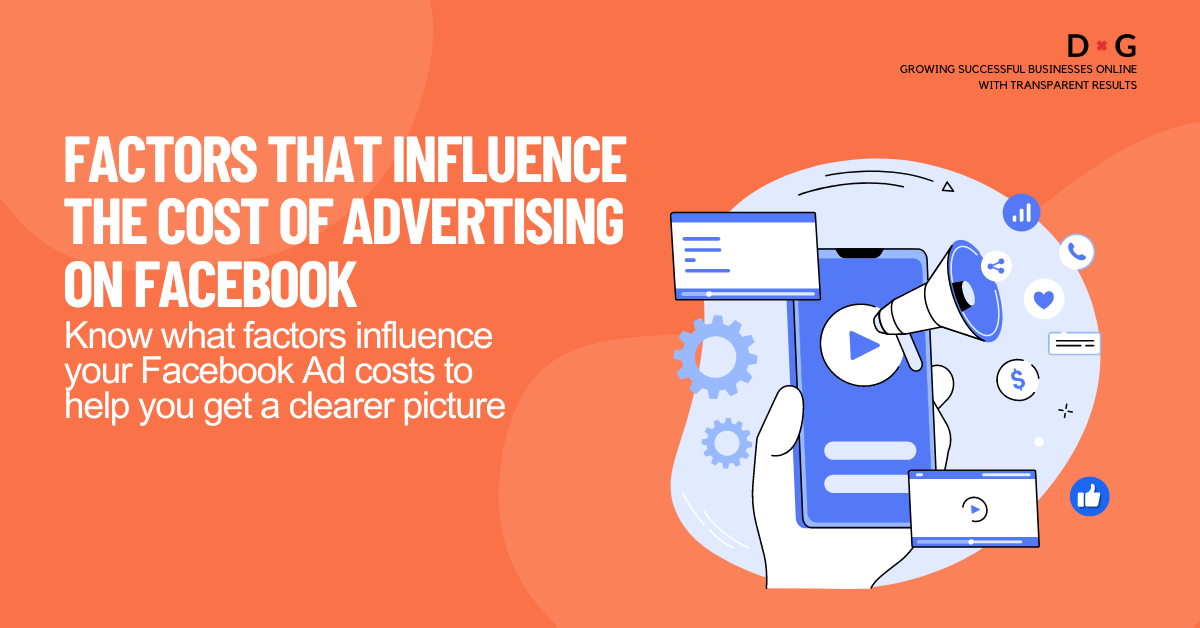
Advertising on Facebook has become a crucial strategy for businesses of all sizes. Facebook offers excellent reach and targeting abilities with its massive user base. However, understanding the cost of advertising on this platform can be challenging due to various factors that influence pricing. Knowing these factors can help you optimise your ad spend and achieve better results.
In this post, we will delve into specific elements that affect the cost of advertising on Facebook and provide insights on how to manage and optimise these costs effectively.
Factors Influencing Facebook Advertising Costs
Thinking about Facebook advertising but worried about the costs?
You’re not alone. Figuring out your budget can be tricky, but it is not impossible. So whether you’re new to this or a seasoned pro, understanding these factors can help you get the most out of your budget.
So, let’s dive in!
Ad Objective
Brand Awareness
Campaigns aimed at increasing brand visibility usually cost less per impression. These campaigns aim to show your ad to as many people as possible within your target audience.
Traffic
Ads designed to drive traffic to a website or landing page typically cost more per click (CPC) than brand awareness campaigns. The goal is to encourage users or target audiences to visit a specific page.
Conversions
Conversion-focused campaigns usually cost more because they aim to drive specific actions, such as purchases or sign-ups. These campaigns are often priced on a cost per action (CPA) basis, which can be higher due to the increased value of the conversion.
Choosing the right objective is crucial for controlling costs and achieving desired outcomes.
Ad Quality and Relevance
Facebook rates the quality and relevance of your ads through a set of metrics known as ad relevance diagnostics. These diagnostics help determine how your ads are perceived by the target audience and influence the cost of your advertising.
The key components are:
Quality Ranking
This measures the perceived quality of your ad compared to other ads competing for the same audience. Higher quality rankings lead to lower ad costs.
Engagement Rate Ranking
This evaluates how well your ad is expected to engage users, based on historical data. Ads with higher engagement rates are often shown more frequently and at a lower cost.
Conversion Rate Ranking
This metric assesses how likely your ad is to achieve its conversion goal compared to others. A higher conversion rate ranking can result in more efficient ad spend.
Ensuring that your ads are of high quality and relevant to your audience can improve these rankings, leading to better ad placements and lower costs.
Bidding Strategy
Your bidding strategy impacts your Facebook ad costs.
There are two main types of bidding strategies: automated bidding and manual bidding.
Automated Bidding
This strategy lets Facebook’s algorithm set bids for you to get the best results at the lowest cost. Automated bidding is convenient and can lead to lower costs, especially for beginners or those with limited time to manage campaigns.
Manual Bidding
This option lets you control the highest amount you’re willing to pay per click or conversion. While it requires more management and expertise, manual bidding can be beneficial for advertisers who want precise control over their budget and bid amounts.
Choosing the right bidding strategy depends on your campaign goals, budget, and how experienced you are with Facebook ads.
Industry and Competition
The competitiveness of your industry affects ad costs. Some industries have higher average costs per click (CPC) and cost per mille (CPM) due to intense competition.
For example:
Finance and Insurance
These industries typically face high ad costs because many companies are competing for the same audience, driving up bid prices.
Real Estate
Similar to finance and insurance, the real estate market is highly competitive, leading to increased advertising costs.
E-commerce
Depending on the product and target market, e-commerce businesses can also experience high costs due to competition, especially during peak shopping periods.
Understanding the competitive landscape of your industry can help you set realistic expectations for your ad costs and develop strategies to manage them effectively.
Seasonality
Facebook ad costs can change depending on the time of year. Some seasons of the year and events can cause more competition and higher costs.
For instance:
Holidays
During the holiday season, many businesses ramp up their advertising efforts to capture the increased consumer spending. This surge in demand can drive up ad costs.
Major Events
Events like Black Friday, Cyber Monday, and other significant sales events can also lead to higher ad costs as more businesses compete for consumer attention.
Being aware of these seasonal trends can help you plan your advertising budget more effectively. It’s often beneficial to allocate more budget during peak seasons when the return on investment (ROI) potential is higher, even if the costs are elevated.
Conclusion
Understanding the factors that influence the cost of advertising on Facebook is essential for any business looking to maximise their return on investment.
By considering ad objectives, ad quality and relevance, bidding strategies, industry competition, and seasonality, you can better manage your advertising costs and achieve your marketing goals.
Keep monitoring and adjusting your strategies to stay ahead in the competitive landscape of Facebook advertising.
Curious about budgeting for paid ads? Dive into our blog post about How Much Money Should You Spend on Paid Advertising?
Don’t have the time to manage paid ads yourself? No worries! We can handle it for you.
Take a look at our blog about the 6 advantages of working with a digital marketing agency. If you need help to grow your business send us a message.
